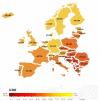Corruption and Population Health in the European Union Countries-An Institutionalist Perspective
- PMID: 35564505
- PMCID: PMC9102900
- DOI: 10.3390/ijerph19095110
Corruption and Population Health in the European Union Countries-An Institutionalist Perspective
Abstract
Even though the European Union (EU) is considered one of the best performers in the world in fighting corruption, the situation changes when the analysis is shifted to the national dimension of its member states, with significant differences concerning the effects of corruption on population health. Using the theory of New Institutional Economics as a complementary tool that provides additional representativeness to this phenomenon, the aim of this paper is to empirically investigate the impact of corruption on population health, considering also other demographic and socio-economic determinants. Using data collected at the EU level registered between 2000-2019, we employ panel date models to validate the ongoing effect of perceived corruption on population health. Our empirical findings fully validate the institutionalist perspective, according to which countries with inclusive institutions better control the anomaly of corruption while benefitting from higher life expectancy and reducing child mortality rates. Conversely, the EU countries with rather extractive institutions suffer in terms of both longevity of population and infant mortality. Our study emphasizes that in tackling corruption pressure on population health, the most effective way is to improve the quality of governance in countries with fragile institutions.
Keywords: child mortality; corruption; extractive institutions; inclusive institutions; life expectancy at birth; population health.
Conflict of interest statement
The authors declare no conflict of interests.
Figures
Similar articles
-
Public sector reforms and their impact on the level of corruption: A systematic review.Campbell Syst Rev. 2021 May 24;17(2):e1173. doi: 10.1002/cl2.1173. eCollection 2021 Jun. Campbell Syst Rev. 2021. PMID: 37131927 Free PMC article. Review.
-
CENTRALIZATION AND CORRUPTION IN HEALTH PROCUREMENT OF THE SOUTHERN EUROPEAN UNION COUNTRIES.Georgian Med News. 2024 Mar;(348):10-21. Georgian Med News. 2024. PMID: 38807383
-
Corruption costs lives: a cross-country study using an IV approach.Int J Health Plann Manage. 2016 Apr;31(2):175-90. doi: 10.1002/hpm.2305. Epub 2015 Jun 29. Int J Health Plann Manage. 2016. PMID: 26122874
-
Corruption and health outcomes within an economic and cultural framework.Eur J Health Econ. 2020 Mar;21(2):195-207. doi: 10.1007/s10198-019-01120-8. Epub 2019 Oct 5. Eur J Health Econ. 2020. PMID: 31587123
-
Untangling the corruption maze: exploring the complexity of corruption in the health sector.Health Econ Rev. 2024 Jul 12;14(1):50. doi: 10.1186/s13561-024-00530-6. Health Econ Rev. 2024. PMID: 38995456 Free PMC article. Review.
Cited by
-
Food insecurity, environment, institutional quality, and health outcomes: evidence from South Asia.Global Health. 2024 Mar 8;20(1):21. doi: 10.1186/s12992-024-01022-2. Global Health. 2024. PMID: 38459556 Free PMC article.
-
Neighborhood Sanitation and Infant Mortality.Am Econ J Appl Econ. 2018 Apr;10(2):125-162. doi: 10.1257/app.20150431. Am Econ J Appl Econ. 2018. PMID: 38213507 Free PMC article.
-
Determinants of life-expectancy and disability-adjusted life years (DALYs) in European and Organisation for Economic Co-operation and Development (OECD) countries: A longitudinal analysis (1990-2019).SSM Popul Health. 2023 Aug 10;24:101484. doi: 10.1016/j.ssmph.2023.101484. eCollection 2023 Dec. SSM Popul Health. 2023. PMID: 37680998 Free PMC article.
-
What is the role of institutional quality in health outcomes? A panel data analysis on 158 countries from 2001-2020.Heliyon. 2023 Sep 17;9(9):e20251. doi: 10.1016/j.heliyon.2023.e20251. eCollection 2023 Sep. Heliyon. 2023. PMID: 37809989 Free PMC article.
-
Global Pattern and Disease Heterogeneity Drivers in Aging Populations.Geohealth. 2025 Jun 16;9(6):e2025GH001335. doi: 10.1029/2025GH001335. eCollection 2025 Jun. Geohealth. 2025. PMID: 40525200 Free PMC article.
References
-
- Acemoglu D., Robinson J. Why Nations Fail: The Origins of Power, Prosperity, and Poverty. Crown Publishers; New York, NY, USA: 2010. pp. 1–571.
-
- Mauro P. Why Worry about Corruption? Volume 6. International Monetary Fund; Washington, DC, USA: 1997. pp. 1–19.
-
- Uslaner E.M., Rothstein B. The Historical Roots of Corruption: State Building, Economic Inequality, and Mass Education. Comp. Politics. 2016;48:227–248. doi: 10.5129/001041516817037736. - DOI
-
- Transparency International What Is Corruption? [(accessed on 11 January 2022)]. Available online: https://www.transparency.org.
-
- Lavallée E., Razafindrakoto M., Roubaud F. Corruption and Trust in Political Institutions in Sub-Saharan Africa. East Michigan State University; Lansing, MI, USA: 2008. Afrobarometer Working Paper no. 102.
MeSH terms
LinkOut - more resources
Full Text Sources


